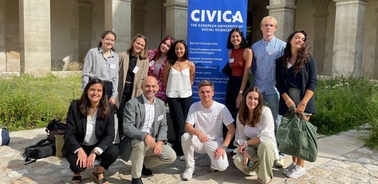- Home
- Civica
- Civica News
- Borja Santos On Global Education And Misinformation: Insights From The Vice Dean Of Ie School Of Politics, Economics, And Global Affairs
Borja Santos on global education and misinformation: Insights from the Vice Dean of IE School of Politics, Economics, and Global Affairs

Vice Dean Borja Santos reflects on CIVICA, the importance of internationalization of Higher Education and the challenges posed by misinformation
Throughout a week, IE University has hosted the CIVICA Honours Seminar ‘Democracy and Misinformation’, led by IE School of Politics, Economics, and Global Affairs Professors Nina Wiesehomeier and D.J. Flynn. Following the seminar’s opening ceremony, Vice Dean Borja Santos shared his insights on CIVICA, the importance of international exchange for education, and the role of misinformation in today’s global challenges.
“We are very honored to be part of CIVICA. We truly believe that international associations, networks, and exchanges are essential for the university’s mission, which is enhancing education and generating better knowledge,” he said.
How would you describe CIVICA?
“It is an excellent network. It has helped us connect and collaborate with the top Social Sciences Schools in Europe. All of them are European, and we believe that together, we represent the European identity by sharing innovative ideas, conducting research together, and providing joint educational opportunities.”
How significant is CIVICA for IE University?
“We believe that the internationalization of universities is crucial in helping students become more tolerant and develop a deeper intercultural understanding of different perspectives. We enhance students' skills: a European report shows that students who participate in international or European exchange programs have, on average, 25% higher chances of securing a job. In terms of autonomy, resilience, and skill development, we are actively promoting CIVICA in all these areas.”
What would you say about the role of researchers and IE University activities in CIVICA?
“Researchers collaborate across different areas of expertise, sharing their work and networking. They organize research workshops on topics such as climate, climate finance, and different pressing issues. They also co-author papers to exchange knowledge. In addition, at both the master’s and bachelor’s levels, we organize European weeks where students learn together on various topics. We also offer joint courses between universities, allowing students to mix and collaborate. Furthermore, we facilitate international mobility and exchange programs to enhance the academic experience.”
What are your thoughts on the CIVICA Honours Seminar, “Democracy and Misinformation”?
“We are building these networks, which symbolize a kind of European university. One example is this workshop: in just one classroom, we counted more than 12 nationalities, with participants from four top universities. We are addressing a crucial and fundamental issue in today’s society: misinformation and fake news. According to the World Economic Forum’s Global Risks Report, misinformation has been identified as the top risk for the next two years. It affects public opinion, which in turn impacts and undermines our democratic institutions, shape perceptions of climate change and how we respond to it, and influences our approach to global crises such as pandemics. Misinformation plays a role in nearly all major domestic and global challenges we face today. Understanding how to combat it is essential for policymakers and those working in these critical fields.”